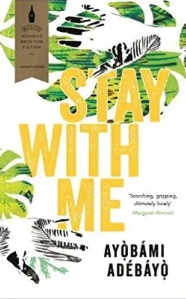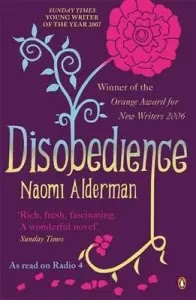Linda Grant's The Dark Circle and Ayobami Adebayo's Stay With Me
I've been reading two of the Baileys Women's Prize for Fiction shortlisted books in preparation for the winner's announcement on Wednesday. I won a copy of 'Stay With Me' by Ayobami Adebayo in a Twitter competition.
'Stay With Me,' set in Nigeria during a period of political turmoil in the 1980s, tells the story of Yejide, who is married to Akin and has struggled to conceive after four years of marriage. Akin's family decides he must marry a second wife, Funmi, in order to bear the children that Yejide is unable to bear. She eventually conceives after a long phantom pregnancy, but the threat of sickle-cell disease hangs over the family. Years later, Yejide is scheduled to attend Akin's father's funeral, where she will face the consequences of her actions in the past. The narrative alternates between Yejide and Akin's points of view on events, and the precarity of their relationship is mirrored in the backdrop of the region's political upheaval. The subject of childlessness and bereavement is painful, and the number of domestic tragedies is almost unending. There are, however, many surprises along the way, particularly in Adebayo's multi-layered portrayal of Yejide and Akin. Their individual reactions to grief, as well as the mistakes they make under the weight of expectations from both sides of their families, are presented sensitively.
Yejide has been affected by her mother's death during childbirth, while Akin harbors unexpected secrets that eventually expose his own vulnerabilities. 'Stay With Me' is a fantastic debut novel that holds a lot of promise. It is not a book I could easily dismiss, and I believe Adebayo is an author to keep an eye on in the future.
In 'The Dark Circle,' Jewish teenage twin siblings Lenny and Miriam Lynskey live in London in 1949, confronted by the harsh realities of post-war austerity. When Lenny goes to the doctor after being conscripted for national service, it is discovered that he has tuberculosis, which he quickly passes on to his sister. They are both sent to the Kent countryside as two of the first patients to receive free healthcare through the newly formed NHS at the Gwendolyn Downie sanatorium, which was originally established as a private facility. Valerie, an Oxford graduate who introduces Miriam to literature, Hannah, a German music teacher, and Arthur Persky, an American merchant seaman are among the patients the twins meet. Patients are being tested on experimental new treatments for the disease, with varying degrees of success, including the new "miracle" antibiotic Streptomycin. Grant excels at bringing historical details to life while also addressing contemporary issues such as the future of the NHS and the status of refugees. It is worth noting that the government significantly underestimated the number of middle-class citizens who would use the service. Many people believed that free healthcare would breed a nation of "free loaders," using language that sounds eerily similar to arguments made today in the right-wing press. This makes 'The Dark Circle' a timely read that raises many questions for the reader about the underlying effects of rose-tinted nostalgia, the famed British stiff upper lip, and how much society attitudes have changed.
'The Dark Circle' also discusses recovery outside of drugs, such as the importance of books, music, and good company in restoring health. It is a particularly relevant theme in the post-war context of a nation still reeling from the devastation of war. The final section, which tells us what happened to the patients decades later, isn't really necessary to the plot, but it does highlight how a disease that was once considered a serious and often deadly public health threat has been virtually eradicated in a relatively short period of time.
Do Not Say We Have Nothing by Madeleine Thien, The Power by Naomi Alderman, 'The Sport of Kings' by C. E. Morgan, and 'First Love' by Gwendoline Riley are the other books shortlisted for this year's Baileys Prize. I'd like to see 'The Power,' the speculative novel about what might happen in a world where women are more powerful than men, win the overall prize because a win for this speculative novel about what might happen in a world where women are more powerful than men would be a powerful statement indeed in 2017.
READ ARTICLES:


.jpg)


Comments
Post a Comment